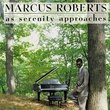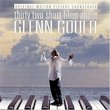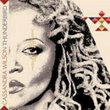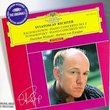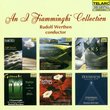| All Artists: Claude Debussy, Mitsuko Uchida Title: Debussy: 12 Etudes Members Wishing: 1 Total Copies: 0 Label: Philips Release Date: 7/4/2006 Album Type: Original recording remastered Genre: Classical Styles: Forms & Genres, Etudes, Symphonies Number of Discs: 1 SwapaCD Credits: 1 UPC: 028947575597 |
Search - Claude Debussy, Mitsuko Uchida :: Debussy: 12 Etudes
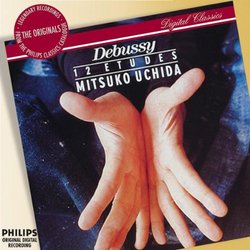 | Claude Debussy, Mitsuko Uchida Debussy: 12 Etudes Genre: Classical
|
Larger Image |
CD DetailsSimilarly Requested CDs
|
CD ReviewsABSTRACT IMPRESSIONIST DAVID BRYSON | Glossop Derbyshire England | 12/30/2006 (5 out of 5 stars) "Debussy attached no picturesque captions to his etudes. Each of the 12 has only a functional description from him - thirds, octaves, repeated notes and so forth. Even the phrases he attached to his preludes (at the end of each piece, be it remembered, not as titles) don't seem to me to define the pieces (except for the one called `alternate thirds'). Debussy's piano music always sounds to me to be largely abstract in inspiration, and when it comes to his last set of pieces, the 12 etudes, he is not even pretending otherwise. To my ears, this is the greatest of his piano music, and it will stand with the greatest of anyone's. It is also the most difficult to play, purely at the technical level. When the works are avowedly `studies' what would you expect? I once took encouragement from a remark in Arthur Hedley's book on Chopin to the effect that there is no difficulty in Chopin's other work that is not prepared for in the studies. Only after I bought the studies did I realise that this really meant that if you could play those you could play anything else. What is Brahms's most difficult work for piano solo? Most competent pianists will tell you `The Paganini Variations', subtitled, of course, `studies'. So too with Debussy, and this view colours my idea of how these works should be played. They will not sound as if they stretch a player with enough technique, but they ought to be made to sound daunting for most of us, and that convinces me that Uchida's interpretation is the right one in all essentials. She takes a highlighted approach, with the more spectacular effects played up. I find her tempi to be reasonable implementations of the composer's markings, which are clear enough except in the second study - what in all the world is `moderato, ma non troppo'? Uchida takes a fastish speed, and so would I have if I could play the piece. Where the prescribed speed is slow without qualification, as in the `sixths' piece, that is how she does it, and I find her memorable in the great `pour les Agrements', expressing fine solemnity as it ends. Uchida's tone-colouring is vivid without being overdone for my own taste, and the compass of her volume is surely about right for music of this period and of this style -- not as in Rachmaninov but with a good strong tone when the composer asks for that, and also the faint and remote pianissimo that is so central to Debussy's expression. Whatever one thinks about her fast speeds here and there, she does not set any records for high coloration in the tone. We have all long been used to the way Michelangeli handles the first book of the preludes, and Uchida is not trying to emulate that. Comparisons might be more important if these great compositions were better known than they seem to be. I can't account for their neglect except to admit that I have been guilty of ignoring them too. When a range of top-flight interpretations, such as we are accustomed to throughout the major piano repertory, is available that will be the time to take a microscope to Uchida's version and give fine and minute weighting to the details. For the time being I shall just say that I consider this a major set of renderings, one that is likely to stand comparison with anything else that may be coming along. The sound dates originally from 1990, and it does not interfere with my appreciation of the subtlety of touch that matters almost more in Debussy than in any other composer for the piano. The English liner-note is by the ever-dependable Misha Donat, and I have not bothered to read the French offering or its translation into German. Donat predictably shows insight into this marvellous music, Uchida shows the same where it matters more, I shall work to catch up with them as best I can and I urge everyone else to do likewise." An Astonishing Performance D. A Wend | Buffalo Grove, IL USA | 08/02/2007 (5 out of 5 stars) "The Douze Etudes pour piano of Claude Debussy are late works, dating to 1915, and were written following a commission by his publisher, Jacques Durand, to prepare an edition of Chopin's piano works. The Etudes are studies of composition as well as keyboard technique, and influenced many composers like Schoenberg, Messien and Boulez in their piano compositions. Debussy's Etudes do not have the appeal of his other piano music but they are more than just exercises too. The Etudes are a technical challenge for the performer but have little appeal for an audience. I have had this recording of Debussy's Etudes by Mitsuko Uchida since they were issued in 1990, so it is nice to see the recordings have been reissued. Ms. Uchida is able to bring off the Etudes with a lot of conviction that give the pieces great appeal. Her virtuosity is quite amazing as she captures every nuance of the music. My favorite pieces are the 11th and 12th Etudes, the first so beautifully dream-like that one could believe that the music would just evaporate into the air; and the bold 12th Etude with its shattering chords; the 10th study reminds me of a nocturne. All of the studies are brilliantly played with each going from strength to strength of technical virtuosity. The only "problem" with this disc is that at 47 minutes it is far too short. One wonders why Ms. Uchida did not record some additional music of Debussy or some other composer that was influenced by the Etudes. Still, this is a performance to savor and demands to be heard. " Eastern approach to Impressionism. A. F. S. Mui | HK | 02/08/2010 (3 out of 5 stars) "The interpretation here is NOT Western.
It is very Japanese - the very essence of the Japanese Shintoism. If you are familiar with classic Japanese music, you'd at once recognise this. It is eerie, it is mysterious, it is very abstract to Western ears, but no secret to a pair of eastern ears like mine. To what extent is such the intention of Debussy, I am left to wonder. However, if you consider that this is an acceptable approach, this is still a very decent performance. I personally would opt for other more convincing Western intepretations." |

 Track Listings (12) - Disc #1
Track Listings (12) - Disc #1